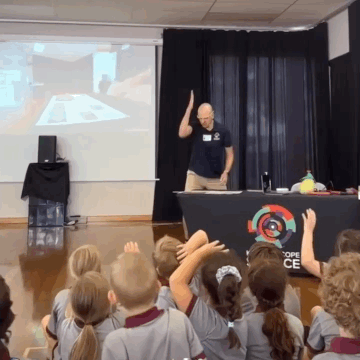The Air, Atmosphere & Weather Show
Primary School Incursion (K-6)
Air can do amazing things! This show will put your students in touch with the air around them, by exploring some of the intriguing and spectacular things that air can do, and the way science can help people predict and respond to weather phenomena. These interactive and surprising demonstrations will include a spinning fire tornado, flaming teabag rocket, vacuum-powered bazooka and more.
-
Seasons, day & night (optional)
Lifting a person with air
Tug-of-war with air
Expanding and contracting air
Vacuum-powered rocket
Snapping a ruler with air pressure
Fire tornado
Teabag rocket (years K-2 only)
Greenhouse gases & climate change (years 3-6 only)
*Demonstrations performed will be customised to suit the audience age and may depend on venue or time constraints
-
$705 per show (incl. GST)
-
Sydney, Central Coast & Newcastle
-
Up to 150 students per show
-
Years K-6
-
Set up: 30-60 minutes
Show: 60 minutes
Pack up: 30-60 minutes
-
Indoor venue (hall is ideal) with power outlet & space for students to sit
Access to sink with running water before each show
Accessible off-street parking for the duration of our visit, allowing for a 1-hour set up and pack up time
(optional) 2x trestle tables, if available
(optional) Access to venue projector, if available
-
Weather In My World (Kindergarten)
-
SCIENCE UNDERSTANDING
Foundation:
Daily and seasonal changes in our environment, including the weather, affect everyday life (ACSSU004)
Objects are made of materials that have observable properties (ACSSU003)
Year 1:
Everyday materials can be physically changed in a variety of ways (ACSSU018)
Observable changes occur in the sky and landscape (ACSSU019)
Year 2:
A push or a pull affects how an object moves or changes shape (ACSSU033)
Earth’s resources, including water, are used in a variety of ways (ACSSU032)
Year 3:
A change of state between solid and liquid can be caused by adding or removing heat (ACSSU046)
Heat can be produced in many ways and can move from one object to another (ACSSU049)
Year 4:
Living things, including plants and animals, depend on each other and the environment to survive (ACSSU073)
Natural and processed materials have a range of physical properties; These properties can influence their use (ACSSU074)
Earth’s surface changes over time as a result of natural processes and human activity (ACSSU075)
Forces can be exerted by one object on another through direct contact or from a distance (ACSSU076)
Year 5:
Solids, liquids and gases have different observable properties and behave in different ways (ACSSU077)
Year 6:
Changes to materials can be reversible, such as melting, freezing, evaporating; or irreversible, such as burning and rusting (ACSSU095)
Sudden geological changes or extreme weather conditions can affect Earth’s surface (ACSSU096)
SCIENCE AS A HUMAN ENDEAVOUR
Foundation:
Science involves exploring and observing the world using the senses (ACSHE013)
Year 1:
Science involves asking questions about, and describing changes in, objects and events (ACSHE021)
People use science in their daily lives (ACSHE022)
Year 2:
Science involves asking questions about, and describing changes in, objects and events (ACSHE034)
People use science in their daily lives (ACSHE035)
Year 3:
Science involves making predictions and describing patterns and relationships (ACSHE050)
Science knowledge helps people to understand the effect of their actions (ACSHE051)
Year 4:
Science involves making predictions and describing patterns and relationships (ACSHE061)
Science knowledge helps people to understand the effect of their actions (ACSHE062)
Year 5:
Science involves testing predictions by gathering data and using evidence to develop explanations of events and phenomena (ACSHE081)
Scientific understandings, discoveries and inventions are used to solve problems that directly affect peoples’ lives (ACSHE083)
Scientific knowledge is used to inform personal and community decisions (ACSHE217)
Year 6:
Science involves testing predictions by gathering data and using evidence to develop explanations of events and phenomena (ACSHE098)
Scientific understandings, discoveries and inventions are used to solve problems that directly affect peoples’ lives (ACSHE100)
Scientific knowledge is used to inform personal and community decisions (ACSHE220)
SCIENCE INQUIRY SKILLS
Foundation:
Respond to questions about familiar objects and events (ACSIS014)
Explore and make observations by using the senses (ACSIS011)
Engage in discussions about observations and use methods such as drawing to represent ideas (ACSIS233)
Share observations and ideas (ACSIS012)
Year 1:
Respond to and pose questions, and make predictions about familiar objects and events (ACSIS024)
Participate in guided investigations to explore and answer questions, such as manipulating materials and testing ideas (ACSIS025)
Use informal measurements in the collection and recording of observations (ACSIS026)
Through discussion, compare observations with predictions (ACSIS212)
Year 2:
Respond to and pose questions, and make predictions about familiar objects and events (ACSIS037)
Participate in guided investigations to explore and answer questions, such as manipulating materials and testing ideas (ACSIS038)
Use informal measurements in the collection and recording of observations (ACSIS039)
Through discussion, compare observations with predictions (ACSIS214)
Year 3:
With guidance, identify questions in familiar contexts that can be investigated scientifically and predict what might happen based on prior knowledge (ACSIS053)
Suggest ways to plan and conduct investigations to find answers to questions (ACSIS054)
Safely use appropriate materials, tools or equipment to make and record observations, using formal measurements and digital technologies as appropriate (ACSIS055)
Compare results with predictions, suggesting possible reasons for findings (ACSIS215)
Reflect on the investigation, including whether a test was fair or not (ACSIS058)
Year 4:
With guidance, identify questions in familiar contexts that can be investigated scientifically and predict what might happen based on prior knowledge (ACSIS064)
Suggest ways to plan and conduct investigations to find answers to questions (ACSIS065)
Safely use appropriate materials, tools or equipment to make and record observations, using formal measurements and digital technologies as appropriate (ACSIS066)
Compare results with predictions, suggesting possible reasons for findings (ACSIS216)
Reflect on the investigation; including whether a test was fair or not (ACSIS069)
Year 5:
With guidance, pose questions to clarify practical problems or inform a scientific investigation, and predict what the findings of an investigation might be (ACSIS231)
With guidance, plan appropriate investigation methods to answer questions or solve problems (ACSIS086)
Decide which variable should be changed and measured in fair tests and accurately observe, measure and record data, using digital technologies as appropriate (ACSIS087)
Use equipment and materials safely, identifying potential risks (ACSIS088)
Compare data with predictions and use as evidence in developing explanations (ACSIS218)
Suggest improvements to the methods used to investigate a question or solve a problem (ACSIS091)
Year 6:
With guidance, pose questions to clarify practical problems or inform a scientific investigation, and predict what the findings of an investigation might be (ACSIS232)
With guidance, plan appropriate investigation methods to answer questions or solve problems (ACSIS103)
Decide which variable should be changed and measured in fair tests and accurately observe, measure and record data, using digital technologies as appropriate (ACSIS104)
Use equipment and materials safely, identifying potential risks (ACSIS105)
Compare data with predictions and use as evidence in developing explanations (ACSIS221)
Suggest improvements to the methods used to investigate a question or solve a problem (ACSIS108)
Photos:
Latest Reviews:
FROM FACEBOOK:
①
Book us
②
Book a space
in your school
③
We do the rest!
We come to you - no buses ✓
Fully insured & risk assessments available ✓
Teachers only required for supervision ✓
Aligned with the Australian Curriculum standards ✓
“Understanding is joyous”
Banner image courtesy CSIRO, from the video "There's no such thing as suction"


















